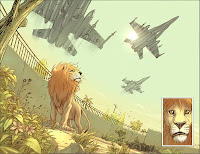Maus: A Survivor’s Tale
Maus, is a graphic novel written by Art Spiegelman, and the story is focused in the World War II and specially in the holocaust in which his parents were involved, it is a amazing history although the drawing is not the best, but despite this issue this masterpiece won a well deserved special Pulitzer Award.
 |
First of all, Art Spiegelman spent around ten years in the creation of Maus, which was published in two parts: the first time called “My father bleeds history” in 1986 and the second one called “And here my troubles began” in 1991. In the next year, he received a Pulitzer award among others.
About the pencils, we can say that the entire novel is in black and white, you can notice that the illustration looks very plain but even with this simplicity is very functional and sympathetic because a normal person can understand the metaphor. The style may be very simple but as the story is developed, we can see the influences, essentially, the expressionism. He uses animals to describe the different types of nationalities, religion or race. The election of the animal is on purpose, a cat for the Nazis (who hunted Jews), mice for the Jews (victims), pigs for the Poles (who somehow betrayed the polish Jews), frogs (the Frenchs), deer (Swedish) and dogs (Americans).
Regarding the narrative, Art and his Vladek (his father) lived in New York
Throughout the story we are witnesses of the psychological issues of the characters and how our background shivers in times of war. Anja, gave birth to Richieu, and when the Nazis started chasing the Jews, they decided to protect their son and send him far away with his auntTosha (Anja’s sister). But when she heard that the Nazis took some children, she freaked out and rather than being taken away from her; she decided to poison her own son Bibbi, her nice Lonia, Richieu and herself.
This issue was overwhelming for both of them. For Vladek, Richieu was the perfect son, and this image stayed with him for the rest of his life. In the other hand, Anja suffered of constants periods of depression until she committed suicide in 1968. These are the two main issues that scarred him for life; despite not getting to know his brother it started an unusual sibling rivalry and the suicide of his mother it was a heavy burden to bear.
At the moment he published the first part, the fame came. He received lots of journalist criticizing his job, asking what the objective of the novel was, what did he want to transmit, and receiving comments about the German people tired of being accused for the holocaust because this new generations did not do anything.
 Although he did not want to communicate a specific message, several messages were implicit. One of them is the spoils and scars of war. While we read about the young Vladek before and during the war, we perceive a happy, smart, enthusiastic and cooperative being. Regarding the old man after the war, we perceive a greedy, stubborn, racist and self-centered being that tries to inflict compassion in people to take advantage of this. This qualities and behavior made Art hesitate, he was the stereotype image of the Jew, and so what would be the reaction of the people towards this issue?. Definitely, a person is able to survive (physically) to war, like Valdek did; but a part of us does not survive. War leaves us very deep psychological wounds and transforms our behavior, leaving hidden scars.
Although he did not want to communicate a specific message, several messages were implicit. One of them is the spoils and scars of war. While we read about the young Vladek before and during the war, we perceive a happy, smart, enthusiastic and cooperative being. Regarding the old man after the war, we perceive a greedy, stubborn, racist and self-centered being that tries to inflict compassion in people to take advantage of this. This qualities and behavior made Art hesitate, he was the stereotype image of the Jew, and so what would be the reaction of the people towards this issue?. Definitely, a person is able to survive (physically) to war, like Valdek did; but a part of us does not survive. War leaves us very deep psychological wounds and transforms our behavior, leaving hidden scars.As an extra matter, in the original novel we can see the bad use of English, Vladek tend to confuse the different times and words so sometimes is difficult to understand 100% but the author deals with it very well.
For me one of the most memorable moments in the novel is when Art realizes that his mother Anja wrote in her diary all her experiences of the war, living in Auschwitz and escaping situations. When Art ask his father about it, Vladek tells him that he got rid of the diaries and the reaction of Art is very devastating, he calls him Murder and curse him.
Finally, this novel is in my top three novels ever, it manages to communicate the atrocious way of living in the ghettos, the camps (like Auschwitz) and an entire environment is against you, constantly losing your possessions and struggling to maintain was left, like Vladek. Also, it has a strong sentimental part, overwhelming situations and turns, and shows the brutal truth of war; exposing the veiled scars of it.
The Bard.





















